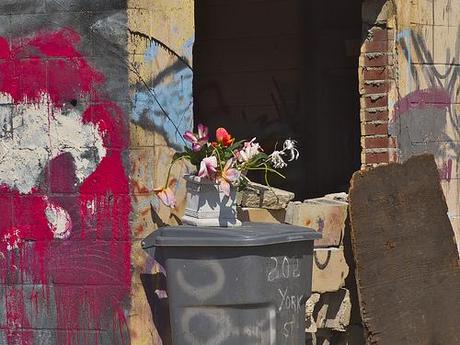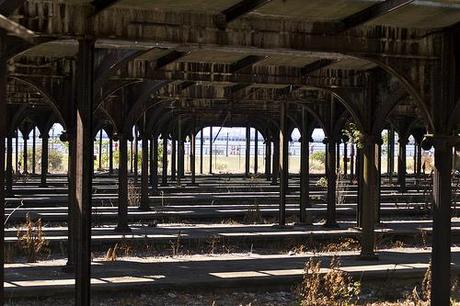
The folks at that website DO like photos for their formal qualities, and that certainly has something to do with the pleasure they take in this photo. The basic composition is of the simplest kind: an object in the center, a vase of flowers, against a background. But the background, simply as a visual object, is complex. It has a fairly wide variety of (sometimes almost vivid) colors, big chunky masses, a strong contrast between light and dark.
But that picture is not simply a formal object. It represents something: a potted flower on the lid of the garbage can. How did that get there, and why?
I happen to know that someone lives there. Presumably he put the flowers there for decoration. Or someone he knows. As this building is covered with graffiti inside and out I've called it the Urban Design Center.
That building is, of course, in Jersey City, where I live. It's a small one near the final couple 100 yards of the Morris Canal, which used to carry coal from the coal regions of Eastern PA (near Bethlehem & Allentown) to the NYC area. I don't know just what that coal was used for. Fuel obviously, but for what? Homes? Factories? Ships? Was some of it shipped overseas? That I don't know. Some of that coal was, I believe, anthracite, which is a particularly hard (structurally) kind of coal and relatively free of impurities (chiefly sulfur). That made it especially got for metallurgical use, that is, turning iron ore into iron. That, I assume, is why the now defunct Bethlehem Steel Company is located in Bethlehem.
That particular area of Jersey City was a busy railroad yard until 50 years or so ago. There are pictures of it here and there on the web. But the railroads left Jersey City when ocean-going freighters moved south, to Elizabeth, NJ, and the Newark Bay, where the water is deeper. Container ships carry more cargo a ride lower in the water than older freighters, hence the harbor had to move.
Once the railroads left – though not completely, freight trains still come through the city – the tracks were ripped up and the surrounding infrastructure was demolished. The area just south of that building is now Liberty State Park, which is a wonderful little park. The old passenger station has become a park building and the roofed structure over the boarding area remains, though the tracks have been removed.



